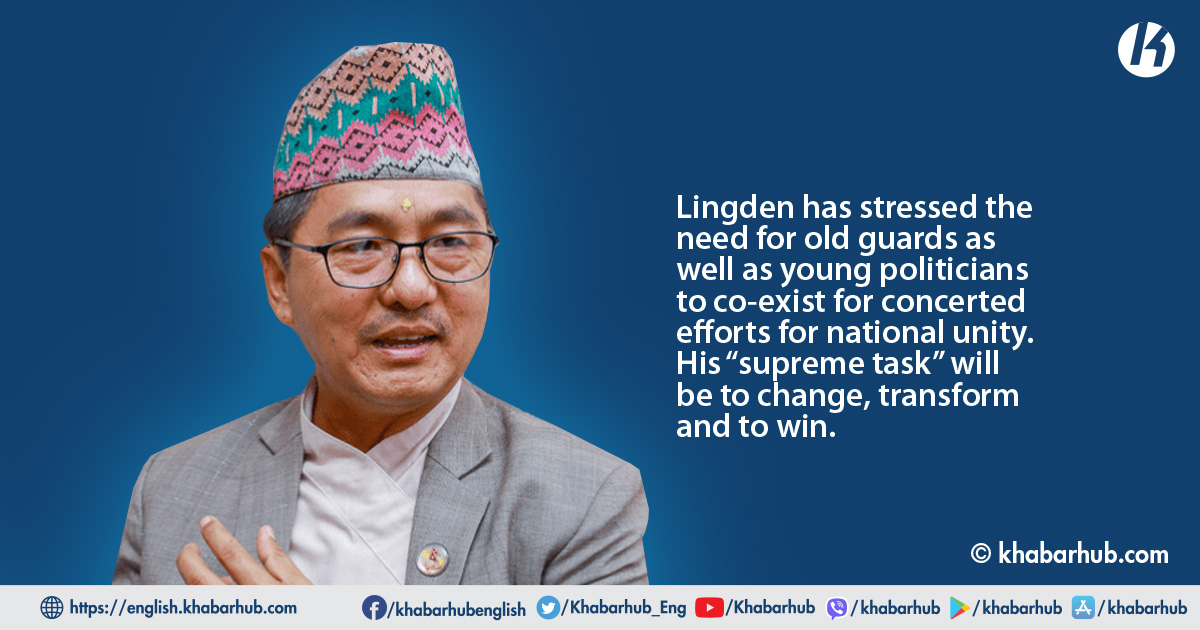0%

KATHMANDU: Rajendra Lingden, a staunch supporter of the Hindu state and monarchy, stole the show on Sunday pushing Kamal Thapa, a Rastriya Prajatantra Party (RPP) stalwart, out of the ring.
The only lawmaker to the House of Representatives representing his party, Lingden reached the helm of RPP — a pro-monarchy and pro-Hindu party — emphasizing the need for old guards as well as young politicians to co-exist to make concerted efforts for national unity.
A Panchthar-born Lingden says his “supreme task” will be to make unity among like-minded political parties, organizations, and individuals for a change and a political transformation.
In fact, the General Convention of the RPP, dubbed as “Unity General Convention” endorsed Lingden’s candidacy, elected him to the helm of affairs, and most importantly proved that the party is in favor of the transformation of the party’s rein to the younger generation, something which other major political parties have failed to act.
However, for this ambitious young politician, who is eyeing the summit of political power, a daunting task lies ahead to take the party forward by encompassing the disgruntled section led by former Chairman Kamal Thapa.
With Lingden’s win, people have come to recognize his face and agenda, and perhaps to pronounce his surname correctly (some pronounce Lingdel) – people, especially the RPP supporters and voters, should learn to say “Lingden”.
At a time when there has been growing public support for restoring a Hindu state and monarchy, Lingden’s political rise can undergo both opportunities and challenges to establish his party’s agenda.
A Graduate in Political Science and History, Lingden, 56, is now viewed as an impending generational shift in Nepali politics as youths and the younger generation have started becoming more vocal demanding changes in the party leadership, including in the Nepali Congress, CPN-UML, and the Maoist Center.
Soon after he was elected, Lingden gave a striking remark saying, “Nepal now needs a monarchy.”
He looked confident when he said that he would encompass all like-minded political parties within the next six months.
Consider what he had to say: “We will build a national force by uniting all the individuals, groups, organizations and parties that are in favor of monarchy and a Hindu nation.”
Besides, he also stressed the need to end corruption in the country. “It is also high time that all Nepalis united against corruption,” he added.
His statement could be a strong signal that his party would not take a stance to get rid of “selfish” politics, hence, triggering a generational shift.
Even before being elected to the party helm, then as the party’s General Secretary, Lingden said his candidacy was the “cry of the younger generation” demanding fair competition and clean politics.
Now that, RPP, which earlier had three chairpersons, will now run by Lingden as the sole-elected chairperson. In this sense, he has a real rise in RPP.
Observers have to say that he is known for his political integrity and simplicity.
According to them, he has succeeded in rising above ethnic narrow-mindedness, and he has proved himself that nation is above politics.
A leader, who rose from the grassroots, established himself in politics due to his simplicity and political integrity.
Going through his past life, Lingden suffered greatly as a political cadre and a leader. During the decade-long Maoist insurgency, he was persecuted by the then Maoist insurgents.
In 2061 BS, the Maoists even set fire to his house while he was the chairman of the Jhapa District Development Committee.
The Maoist cadres even set the hotel that he operated in Birtamod on fire leading to financial bankruptcy.
Whatever the outcome may be, his win has given a powerful message to other political parties in the country about leadership and generation transfer.
Lingden, who had been the then DDC chairman for around 14 months during the direct rule of then King Gyanendra, was ousted after the second People’s Movement.
For survival, he bought a microbus and operated it, and even ran a workshop in Jhapa.
Later, during the people’s movement of 2062/63 BS, some cadres of the then seven-party alliance severely thrashed him. He nearly died, according to Lingden’s close friend from Jhapa.
In fact, it was Lingden who represented the RPP as the one and only lawmaker defeating Nepali Congress influential leader Krishna Prasad Sitaula by a huge margin from Jhapa Constituency No. 3 in the Parliament when his party suffered a nationwide defeat in the last parliamentary election.
At a time when there has been growing public support for restoring a Hindu state and monarchy, Lingden’s political rise can undergo both opportunities and challenges to establish his party’s agenda.
Lingden, who started his political journey in 2036 BS after joining the Nationalist Independent Students’ Union, has categorically said that his party would launch a street movement soon to bring reinstate the monarchy in Nepal, which, however, is a daunting and challenging task.
One of his immediate challenges is to keep the RPP united as former Chairman and several others have vented ire on the former king for interfering in RPP politics favoring Lingden.
He has also another challenge to include the factions led by former party Chairmen Pashupati Shumsher Rana and Dr. Prakash Chandra Lohani.
Whatever the outcome may be, his win has given a powerful message to other political parties in the country about leadership and generation transfer.